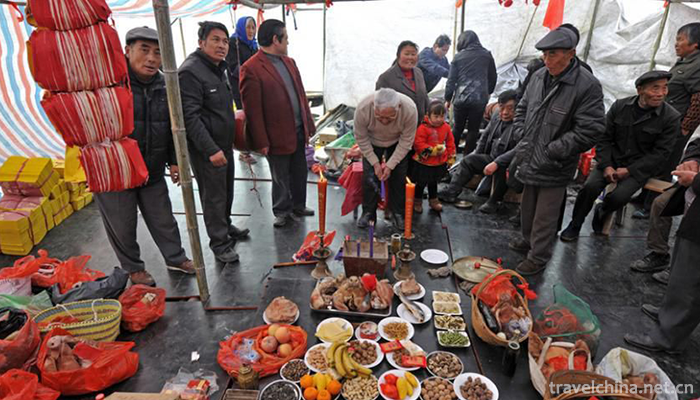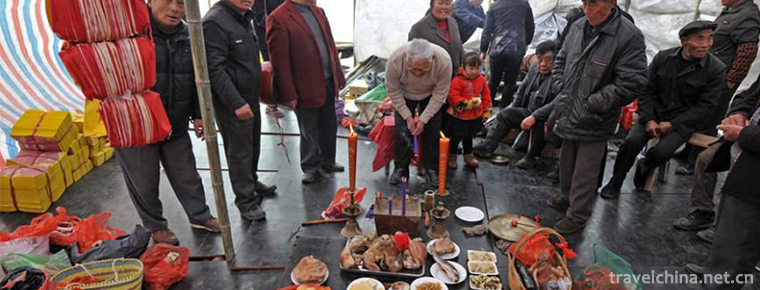Netboat Club
Netboat Club
Netboat Club is an ancient traditional folk custom and folk religious and cultural activities. During the period of the Republic of China, around the Qingming Festival and the Mid-Autumn Festival, tens of thousands of boat household villagers gathered in Liuwang Temple near Jiangsu and Zhejiang provinces to meet the gods. In the democratic village of Lotus Township in the suburb of Liu Wangmiao, during the Republic of China, boat people from all over the country successively established religious groups to worship Liu Wang, such as Shanghai Xingongmen, Laogongmen and Baxian Society in Jiangsu and Zhejiang.
On May 23, 2011, the Netboat Society was approved by the State Council to be included in the third batch of national intangible cultural heritage lists.
Present situation
In 1958, the netboat fair was suspended and Liu Wangmiao was demolished and transformed into a silk weaving factory. However, there were still many worshippers coming from other places. In 1979, there were more than 50,000 people, and in 1986, there were more than 100,000 people burning incense. More women and boat people burned incense. Farmers in Jiangsu came by boat on a special trip. In June 1986, the government of Lotus Township built "Liu Park" at the original temple site, aiming to give new educational significance to this old custom and highlight the function of economic and cultural activities. There were also stone bridgehead temples near the old Liu Wang temple, and temple fairs were held during the netboat fair.
Honor
On May 18, 2010, the Ministry of Culture of China announced the third batch of national intangible cultural heritage list of recommended projects (new entries). Xiuzhou District, Jiaxing City, Zhejiang Province, declared the "net boat club" was selected and included in the category of intangible cultural heritage of folk items.
In 2011, netboats will be included in the third batch of national intangible cultural heritage list.


-
1.Japa Ma and Jami Ma
Japa Ma and Jami Ma are the local traditional folk literature in Lianghe County, Yunnan Province, and one of the national intangible cultural heritage.
Time 2018-12-15 -
2.Construction Techniques of Tibetan Diaolou
Gabu Tibetan ancient building complex is located on the second terrace on the north-east Bank of Mako River, 3 kilometers northeast of Lighthouse Township, Banma County
Time 2019-04-05 -
3.Ancient Clock Repair Skills
Behind the Cining Palace in the Palace Museum of Beijing, there is a row of red pillars and grey tiles. A group of "craftsmen" have been dealing with the treasures of the deep palace
Time 2019-05-01 -
4.Sweat green
"Khan Qing Gele" is a heroic epic of the Mongolian people in Haixi. In the form of rap and speech, it tells the story of the Mongolian heroes destroying demons and saving the people, flashin
Time 2019-05-02 -
5.Firing Techniques of Jizhou Kiln Ceramics
Jizhou kiln is a treasure of the traditional Chinese ceramic crafts. As a world-famous comprehensive ceramic kiln in Jiangnan (Ji'an, Jiangxi), it has strong local style
Time 2019-05-05 -
6.The Craft of Juchunyuan Buddha Jumping Wall
"Buddha Jumping Wall" is the first famous dish in Fujian cuisine. It is well-known at home and abroad for its exquisite materials, unique preparation method and strong flavor
Time 2019-05-08 -
7.Suni embroidery of the Yi nationality
Sani embroidery is a unique technology with a long history. There are many kinds of flower picking techniques, such as picking, embroidering, filling, receiving, buttoning, single-sided picking and do
Time 2019-07-12 -
8.Cao Cao
Wei Wu Di Cao Cao (155 years - 220 March 15th), the name is Geely, the word Meng De, nicknamed hide. Prefectural governor of Yuzhou Qiao (today) Anhui Bozhou Person . Eastern Han Dynasty Outstanding i
Time 2019-09-07 -
9.Needlework of Chinese embroidery
Category: random needling, straight needling, disc needling, trowel needling, grabbing needling, flat needling, scattered wrong needling, weaving embroidery, applying needling, auxiliary needling, variant embroidery
Time 2020-12-12 -
10.Administrative division of Nanchong
Nanchong City governs nine county-level administrative divisions (Municipal District 3, county-level city 1, county-level 5), and 241 township level administrative divisions (street 42, town 161, township 38). It covers an area of 12514 square kilometers and has a population
Time 2020-12-17 -
11.Yibin economy
In 2019, Yibin City will realize a GDP of 260.189 billion yuan, an increase of 8.8% over the previous year in terms of comparable prices. Among them, the added value of the primary industry was 27.764 billion yuan, an increase of 2.9%; the add
Time 2020-12-18 -
12.Dazhou economy
In 2019, Dazhou's GDP will reach a new level, reaching 204.15 billion yuan, with a year-on-year growth of 7.7% based on comparable prices. Among them, the added value of the primary industry was 34.48 billion yuan, an increase of 2.9%; the add
Time 2020-12-20